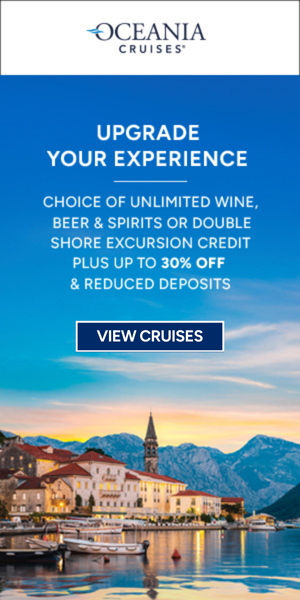What Is the Future of COVID-19 and Related Mandates?
by Dori Saltzman
Photo: Shutterstock.com
Society is inching its way back to normal, said Frank Del Rio, president and CEO of Norwegian Cruise Line Holdings, during a virtual fireside chat with Dr. Scott Gottlieb, former commissioner of the FDA and current chairman of NCL’s SailSAFE Global Health & Wellness Council.
“The world today is in a much different, and dare I say, a better place as far as the pandemic is concerned compared to where we were back during the January peak,” he added. “The prevalence of COVID and the Omicron variant has significantly decreased across the globe and there has been a discernable shift in the psyche of how we are living our daily lives amidst the virus.”
In response to the changes, Norwegian Cruise Line dropped masking requirements and, starting March 1, began accepting children under 12 onboard its ships regardless of vaccination status.
How much more will change for the cruising public is still unclear but Dr. Gottlieb had some predictions to share.
Downward Trending, Fewer Mandates
The prevalence of COVID-19 continues to come down across the country and Gottlieb expects that downward trend to continue.
“Right now we’re at 19 cases per 100,000 people, per day,” Dr. Gottlieb said. “By the end of this month, we’ll probably be closer to 10 cases per 100,000 people per day. And I think that’s going to feel pretty normal around most parts of the country. You’re going to see people going back into restaurants, back into congregant settings.”
Part of that return to normalcy will be more withdrawals of various mandates, starting with kids no longer having to wear masks in school, something most of the country is already seeing.
“We’re seeing a rapid change in policy in respect to governors and others lifting things like mask requirements in schools and pubic settings and I think that’s going to continue. You’re going to see a rapid acceleration in withdrawing a lot of measures that we had in place to try and deal with the epidemic peaks.”
Among his predictions, Gottlieb says that as we move into spring and summer we will see restrictions lifted on a broader basis.
“You’re going to see requirements to get tested before coming into the U.S. from Europe get lifted. You’re going to see requirements for masking on public transportation get lifted.”
In their place, he said, we may see mandates used as temporary tools to deal with peaks of epidemic, such as during the winter in a city with high instances of the virus spreading.
As for the CDC’s public transport mask mandate, which is set to expire in the middle of March, Gottlieb says he expects the CDC to extend it by a handful of weeks.
“I think they’re going to wait until the whole country is green. Right now about 70% of the country is at the low-prevalence range and I think it’s probably going to be the end of April before we see the whole country at that low prevalence range.”
Gottlieb also believes we’ll begin to see quarantine requirements dropped in the U.S.
“You’re seeing authorities dial back the requirements for quarantine and isolation,” he said, referring to the UK, which moved away from mandates, instead asking people to act responsibly if they’re sick.
“I think this is going to become something like the flu where there is an expectation that if you’re diagnosed that you stay home until you feel better and you avoid infecting other people. But it’s not something that’s going to be imposed by public health ordinances.”
No New Variants of Concern, but Seasonal Evolution
In terms of the virus’ trajectory, Gottlieb doesn’t believe a new variant of concern is likely, though he admits there’s always a possibility.
“Anything is possible, but why I think that becomes less likely is because we have so much immunity at this point. We’ve been vaccinated. We’ve been infected with Omicron and we’ve seen a very broad range of what this virus can do. Eventually this virus is going to slow down its ability to mutate. It’s going to slow down its ability to find ways to evade our immune system… it becomes less and less likely that something could come along that would race through the population and pierce that big, tall wall of immunity that we have and create another big wave of infection.”
Nor does Gottlieb believe the Omicron sub-variant BA2 is likely to cause a new wave of infections, though he predicts it will eventually become the dominant strain in the United State, at least for a while.
“Omicron will continue to evolve and we’ll probably have to update our vaccines over time like we do for flu… but that this will evolve into a more seasonal virus,” he said.
Like with the flu, Gottlieb said he expects a quiet spring and summer as far as COVID-19 is concerned, but that it will re-emerge in the fall and winter.
“A lot of people are likely to get a booster going into the fall to take them through this fall and winter and then we’ll see where we are after that,” he added.
Overall, the impact of the virus on society will also go down, both as a result of the higher degrees of immunity we’ve all acquired, as well as more easily accessible therapeutics.
Will Cruise Ships Stop Requiring Vaccinations?
Speaking on behalf of many cruisers and travel advisors, Del Rio asked Gottlieb when he thinks cruise lines will be able to drop the vaccination requirements for boarding their ships. Gottlieb said he wouldn’t expect any changes to the requirements before next spring, at the earliest.
“It is likely to be a requirement that is in place through this fall and winter. The CDC is going to want to see what the epidemiology is of this disease when it gets to a ‘normal’ state. We have not been in a normal state, we’ve been in a pandemic. We’ve had successive waves of infection. The best way to describe what an endemic phase is going to look like is when this becomes more of a seasonable virus, where you don’t see spread of a respiratory pathogen in the spring and summer. It becomes a fall and winter pathogen… we’ll hopefully get our first glimpse of that this year… after we get through another fall and winter with COVID and see if we’re truly in an endemic phase with this.”
Additionally, Gottlieb said whether cruise lines continue to require vaccinations may depend on the vaccines themselves.
“Is the vaccine a tool that prevents people from getting very sick or does the vaccine once again become a tool that can actually prevent spread in a congregant space? If the vaccines get reformulated and all of a sudden they’re 90% protective against any infection and against transmission, that becomes a valuable tool for protecting a congregant setting. If the vaccine ultimately is a tool that prevents you from getting very sick, that becomes something that is more of a personal choice people are making to try and protect themselves rather than using it to prevent themselves from spreading the virus.”




























